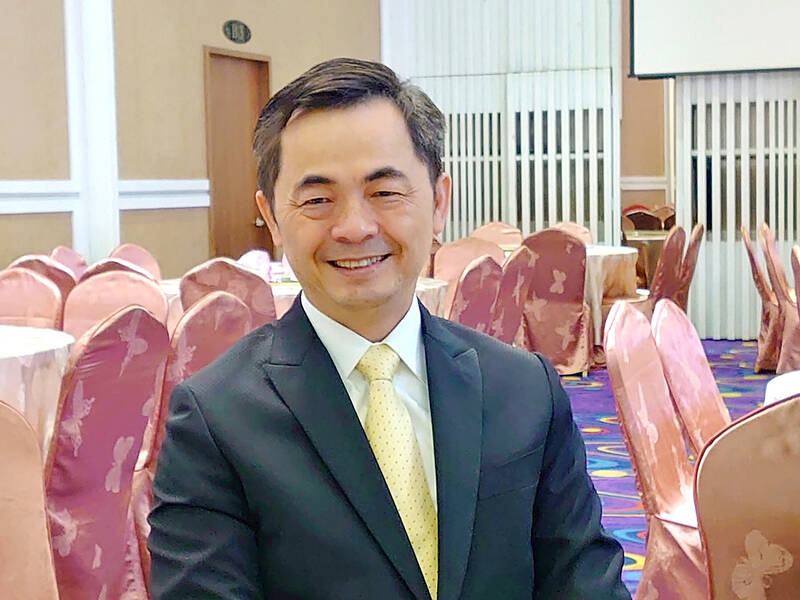Gudeng Precision Industrial Co (家登精密), the sole extreme ultraviolet pod supplier to Taiwan Semiconductor Manufacturing Co (TSMC, 台積電), on Saturday forecast revenue this year would increase more than 20 percent from last year.
The forecast is higher than the company’s 13 percent increase in revenue last year and could bring its revenue to a new high of NT$5.08 billion (US$162.54 million) this year, as the world’s semiconductor industry is expected to resume healthy growth following a slump last year.
The best-case scenario would be annual growth of 40 percent in revenue, Gudeng said

Photo: CNA
Earlier this month, TSMC projected an annual increase of up to 25 percent in revenue this year on the back of robust demand for artificial intelligence and high-performance computing chips.
“We are optimistic about this year’s business outlook, riding on the hype of artificial intelligence chips, which is driving the business of our major customers,” Gudeng chairman Bill Chiu (邱銘乾) told reporters on the sidelines of a company event in New Taipei City’s Sansia District (三峽).
Gudeng said it has secured a new order from a US-based customer to supply wafer pods, which are box-like front-opening unified pods (FOUP) for shipping, transporting and storing wafers, used in the production process of advanced technology as well as advanced packaged technology, which is similar to TSMC’s chip-on-wafer-on-substrate technology.
Another growth area would be China, as Gudeng’s FOUPs are commonly used by Chinese semiconductor companies for new fabs, winning market share from its major US competitor, Chiu said.
An ongoing US-China technology rivalry has prevented Chinese chipmakers from using US-made components, he said.
Revenue contribution from China rose to 31 percent of Gudeng’s total revenue last year, from 17 percent in 2022, the company said.
About 22 new chip manufacturing facilities are under construction in China, mostly focusing on making less advanced chips, in addition to 44 existing fabs, market researcher TrendFore Corp’s (集邦科技) data showed.
To satisfy rising demand, Gudeng is expanding capacity in Taiwan and China, aiming to more than double its wafer carrier capacity to 26,000 units a month by the end of this year, from 12,000.
“We have reasons to be optimistic, given robust demand for mask pods, FOUPs as well as the noncore business of electronic components used in aircraft,” Chiu said.
Meanwhile, revenue at Gudeng aviation subsidiary Jyr Aviation Component Co (朝宇航太科技) is expected to rise to NT$500 million this year from NT$100 million last year thanks to a rebound in travel after the COVID-19 pandemic, the company said.
Jyr Aviation counts Boeing Co and GE Electric Co among its customers, Gudeng said.

Taiwan’s long-term economic competitiveness will hinge not only on national champions like Taiwan Semiconductor Manufacturing Co. (TSMC, 台積電) but also on the widespread adoption of artificial intelligence (AI) and other emerging technologies, a US-based scholar has said. At a lecture in Taipei on Tuesday, Jeffrey Ding, assistant professor of political science at the George Washington University and author of "Technology and the Rise of Great Powers," argued that historical experience shows that general-purpose technologies (GPTs) — such as electricity, computers and now AI — shape long-term economic advantages through their diffusion across the broader economy. "What really matters is not who pioneers

In a high-security Shenzhen laboratory, Chinese scientists have built what Washington has spent years trying to prevent: a prototype of a machine capable of producing the cutting-edge semiconductor chips that power artificial intelligence (AI), smartphones and weapons central to Western military dominance, Reuters has learned. Completed early this year and undergoing testing, the prototype fills nearly an entire factory floor. It was built by a team of former engineers from Dutch semiconductor giant ASML who reverse-engineered the company’s extreme ultraviolet lithography (EUV) machines, according to two people with knowledge of the project. EUV machines sit at the heart of a technological Cold

Taiwan Semiconductor Manufacturing Co (TSMC, 台積電) last week recorded an increase in the number of shareholders to the highest in almost eight months, despite its share price falling 3.38 percent from the previous week, Taiwan Stock Exchange data released on Saturday showed. As of Friday, TSMC had 1.88 million shareholders, the most since the week of April 25 and an increase of 31,870 from the previous week, the data showed. The number of shareholders jumped despite a drop of NT$50 (US$1.59), or 3.38 percent, in TSMC’s share price from a week earlier to NT$1,430, as investors took profits from their earlier gains

TAIWAN VALUE CHAIN: Foxtron is to fully own Luxgen following the transaction and it plans to launch a new electric model, the Foxtron Bria, in Taiwan next year Yulon Motor Co (裕隆汽車) yesterday said that its board of directors approved the disposal of its electric vehicle (EV) unit, Luxgen Motor Co (納智捷汽車), to Foxtron Vehicle Technologies Co (鴻華先進) for NT$787.6 million (US$24.98 million). Foxtron, a half-half joint venture between Yulon affiliate Hua-Chuang Automobile Information Technical Center Co (華創車電) and Hon Hai Precision Industry Co (鴻海精密), expects to wrap up the deal in the first quarter of next year. Foxtron would fully own Luxgen following the transaction, including five car distributing companies, outlets and all employees. The deal is subject to the approval of the Fair Trade Commission, Foxtron said. “Foxtron will be